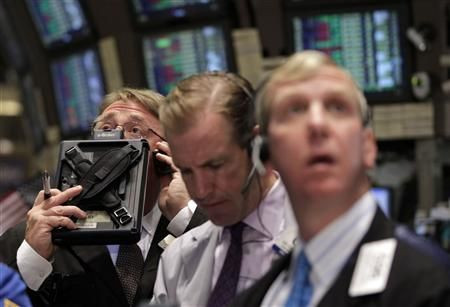Wall Street Falls as Data Outweighs Debt Deal

Stocks fell a sixth day on Monday as weaker-than-expected U.S. manufacturing data and uncertainty over the debt deal in Washington kept the mood skittish on Wall Street.
Healthcare stocks, including United Health , were among the worst performers as investors feared the debt-ceiling deal could lead to cuts in Medicare and other federal health programs, analysts said.
Early gains over the deal aimed at avoiding a U.S. default quickly faded after the Institute for Supply Management (ISM) reported the U.S. manufacturing sector grew at the slowest pace in two years in July. The ISM report also showed new orders contracted.
"One has to carefully consider this economic data point as an indication of a continuing slowdown which will perhaps bleed into earnings," said Chad Morganlander, portfolio manager at Stifel, Nicolaus & Co in Florham Park, New Jersey. "It indicates a lack of vitality that would improve employment."
If lawmakers approve the debt deal before the Tuesday deadline, it may end months of debate over whether the United States can avoid a debt default.
Lawmakers were due to vote later Monday on the White House-backed agreement, which includes spending cuts of $2.4 trillion over 10 years.
Even though a default was considered unlikely by many investors, the threat of a credit rating downgrade continued to weigh on sentiment after Wall Street's worst week in a year last week.
The Dow Jones industrial average <.DJI> was down 106.68 points, or 0.88 percent, at 12,036.56. The Standard & Poor's 500 Index <.SPX> was down 14.49 points, or 1.12 percent, at 1,277.79, down for a sixth day. The Nasdaq Composite Index <.IXIC> was down 35.16 points, or 1.28 percent, at 2,721.22.
The S&P 500 was well below its 200-day moving average at 1,285.37, which had been pegged as support.
"We're moving toward the lower end of (a trading) range, so investors are getting more nervous," said Michael Sheldon, chief market strategist, RDM FINANCIAL in Westport, Connecticut.
The S&P health care index <.GSPA> fell 2.5 percent, leading losses among S&P 500 sectors.
"Medicare is the one that's on the chopping block -- the one that's getting all the threat of a cut if they can't agree," said Marc Pado, U.S. market strategist at Cantor Fitzgerald & Co in San Francisco.
Shares of United Health were down 4.3 percent at $47.48 while shares of Humana Inc dropped 3.1 percent to $72.26, despite Humana reporting a higher-than-expected second-quarter profit.
Among other health-care stocks, shares of Pfizer were down 1.7 percent at $18.91.
Defense-related shares also declined, with the iShares Dow Jones US Aerospace and Defense Index Fund down 2 percent.
U.S. congressional leaders on Monday tried to get the votes needed to pass the White House-backed deal, which emerged after heavy negotiations over the weekend.
"It was a patched compromise deal, with still a lot of uncertainty, so people don't want to get their hands on this issue. If the deal passes, we've averted the threat of a default, but I always thought that was unlikely," said Carl Kaufman, who helps manage just under $2 billion at the Osterweis Strategic Income fund in San Francisco.
(Additional reporting by Ashley Lay and Ryan Vlastelica; Editing by Kenneth Barry)
© Copyright Thomson Reuters {{Year}}. All rights reserved.





















